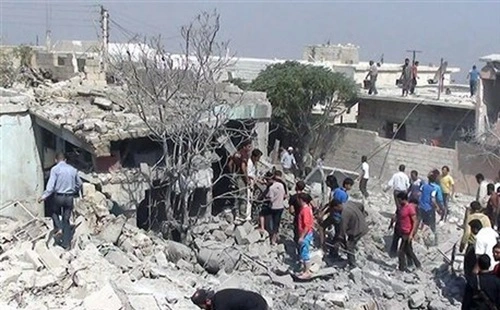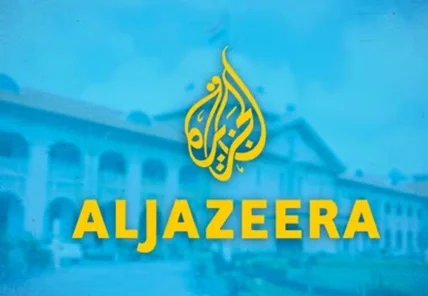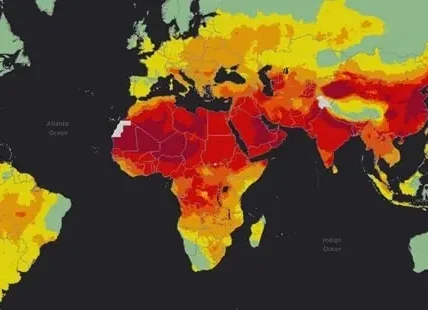You see, usually, Muslim countries have the reputation to be the richest nations in the world, right? But what if we told you that there are some Muslim countries that are among the poorest nations in the world? Well yes, that is the case with many Muslim countries out of the 57 nations that are a part of the Muslim World. So come with us as we take a good look at these top 10 poorest Muslim countries in the world as of 2024. Alright, here we go now.
1. Syria
Syria has a GDP per capita of only $420.62, representing the poorest country among Muslim countries throughout the world. It’s been more than a decade ago when this country was experiencing conflict and its consequences. To make things even more complicated, such a level of violence has dealt a serious blow to its infrastructure, displaced millions from their homeplaces, and has broken very much its agriculture sector which was once a keystone in its economy. Besides, the high-handedness of the government with regard to economic activities, whether private or public, kept at bay any possibility of recovery.
2. Somalia
Economically, it is rated second among the poorest Muslim countries, with a GDP of $592.10 per capita. Their economy is highly based on farming, mainly through raising animals such as goats and sheep. They actually tend to sell more of the animals than the meat produced from the animals. It has been even harder for them, however, by harsh droughts and meager rains, which continue to further worsen the economic crisis. In addition, the ongoing political turmoil in the country has denied Somalia growth and improvement. It has been such challenges that have made it a symbol of poverty in the Muslim world.
Also See: Richest Muslim Countries in the World
3. Yemen
With a GDP per capita of 650.27 US dollars, the economic situation in Yemen is very troubled, especially because of the long-lasting devastating civil war. This war has brought tremendous loss of life, destruction of important infrastructure, and has also brought about a lack of food for many, besides stopping most economic activities. Thus, through its basic needs, the country fully depends on imports, and therefore, Yemen is exposed to very high vulnerability to outside economic forces.
4. Sudan
On the other hand, Sudan was able to reach a GDP per head of just $1,102.15, while it is replete with natural resources. There was always this gigantic barrier, the country is beset by a protracted internal conflict and serious human rights issues that have hugely affected the country’s economic growth. Conversely, sanctions are a lack of foreign investment as a general and great factor limiting the nation’s growth.
5. Comoros
With a GDP per capita of $1,484.89, Comoros stands on very weak ground, especially because of super unexpected food and fuel prices on the global level. Government corruption coupled with a glaring lack of openness chases away investors, who, in any case, would have otherwise been apprehensive because of security concerns. However, even with such a location promise from a tourist point of view and valuable natural resources, the Comoros still managed to find it quite challenging to pull out of serious economic instability.
6. Mauritania
With a total GDP per capita of $2,065.16, Mauritania comes at the sixth spot on this list as of 2024. See, the economy of Mauritania is on the edge, mostly supported by investment and technical support from the outside. Its main economic activities, which include mining and farming, stand helplessly vulnerable in the face of fluctuating global market prices. Moreover, political instability and governance concerns have continued to prevail in Mauritania, therefore presenting a very big challenge for the country to be able to attract and retain foreign investment.
7. Djibouti
The economic field of Djibouti, with a GDP of $3136.11 per capita, has begun to lay more emphasis on the rate of growth but faces a couple of obstacles: one, which is more systemic and politically sensitive while basking in all the economic benefits that can accrue from its location as a port to the sea. But the economic scene in Djibouti and the outcome have not been very pleasing, rather, it has been a very fragile economic setup. It depends too much on the little that goes on in terms of economic activities and the foreign military bases. The country really needs to broaden its economic activities to ensure it can stand strong in the future.
8. Morocco
At $3,441.99 in GDP per capita, Morocco stands as the eighth poorest Muslim country in the world. The Government is putting up spirited fights with plans for the challenges without necessarily emptying the public funds. Farming, however, forms the mainstay of the Moroccan economy, and this is really a sector vulnerable to the vagaries of the weather. The country also depends on a huge part of its economy on the backing of tourists and selling goods to Europe. The economic troubles of the world are felt in this nation when they continue to persist for the long term.
9. Tunisia
This leaves Tunisia with a GDP per capita of $3,747.42 amidst serious political and economic changes, risking financial health. Import prices are climbing, stressing the Tunisian dinar currency, while political instability is chasing foreign investors away. Tunisia is working on economic reforms and trying to attract foreign money to solve its unemployment and encourage steady economic growth.
10. Palestine
Palestine’s GDP per capita of 3,789.33 dollars has thus come up against some distinct economic challenges. It is mainly due to the continuous conflict and trade limits that evidently limit access to markets, availability of resources, and any kind of economic development, all causing high joblessness. With the current conflict with Israel, it is estimated that the GDP per capita of Palestine is going to shrink even more, thus making it rank higher up in this list, which is not good news at all for this nation.
Conclusion
See, many of these Muslim countries are actually facing a lot of issues, mainly because of internal conflicts and disagreements with the neighboring nations. But still, most of these nations are on the path to recovery from poverty and we all can hope for something good for them in the future.

Brandon is the cheif editor and writer at WorldUnfolds.com. With a passion for storytelling and a keen editorial eye, he crafts engaging content that captivates and enlightens readers worldwide.















